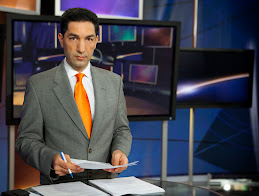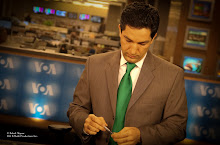۱۳۹۰ دی ۸, پنجشنبه
۱۳۹۰ دی ۷, چهارشنبه
۱۳۹۰ دی ۱, پنجشنبه
۱۳۹۰ آذر ۳۰, چهارشنبه
۱۳۹۰ آذر ۲۹, سهشنبه
۱۳۹۰ آذر ۲۸, دوشنبه
۱۳۹۰ آذر ۲۷, یکشنبه
Free Syrian Army calls for Immediate International Action
Dec 18 (Washington) – Syrian opposition called for a practical international action in Syria warning the West of the consequences of an indifferent position toward the events in that country, a week after an opposition leader pressed the army defectors to stop attacks on pro-government troops.
The Free Syrian Army, a group of army deserters, have stepped up its attacks on security forces in recent weeks,
raising the possibility of Syria slipping into a civil war, and have killed tens of Syrian soldiers in series of deadly attacks on state forces.
“We want Syria’s issue becomes international,” Chairman of
the National Organization for Human Rights in Syria Ammar al-Qurabi said in an interview with the Voice of America (VOA) warning “the threat for the West is that Assad leads Syria toward a civil war or he turns Syria into a base for al-Qaeda, if this revolution gets longer.”
The United Nations said more than 5,000 people have been killed in government’s crackdown on street protests. President Assad has denied any orders were issued to kill demonstrators and said rebels have killed 1,100 of his forces.
According to an activist group, army deserters killed 27 soldiers in southern Syria on Thursday, in one of the deadliest attacks on forces loyal to the President Bashar al-Assad since the start of the popular uprising nine months ago.
Syria’s main opposition bloc the Syrian National Council has urged the three-month-old Free Syrian Army, to limit its operations to protect the civilians and to avoid of the offensive actions on the state security forces.
“We call for international support of the Syrian civilians by creating a safe zone for the Free Syrian Army as well as military and logistic aids,” a spokesman of The Free Syrian Army Ammar al-Wawi said in VOA’s Persian news-talk Ofogh (Horizon) on the same event.

He also said the number of The Free Syrian Army members was estimated about 40 thous
ands and are mainly stationed in north of Syria.
Younes al-Sattar, another member of The Free Syrian Army who participated in the Ofogh debate, stressed on the need of “a buffer zone to supply arms” to the army defectors and said “We want the West to make a major decision in this regard. We need a 25-kilometer-width area along the borders with Turkey.”
US vs IRAN
Syria's foreign backers in the U.N. Security Council, Russia and China, had blocked Western efforts to secure Council condemnation of Damascus, but Russia’s new draft resolution proposed to the Security Council on Thursday condemned the violence in Syria and raised hopes the Council will end its relative silence over crackdown on protestors.
The United States, which had already urged the U.N. Security Council to respond to the rising death toll blaming Assad's forces for using violence against the protestors, said Washington is ready to work with Moscow on the proposal.
Secretary of State Hillary Clinton said after a meeting with top members of opposition Syrian National Council in Geneva on December 6 that the Syrians must not only remove Assad but also advance towards the rule of law.
Washington announced earlier in December it was sending Ambassador Robert Ford back to Damascus six weeks after he was withdrawn for safety reasons. Ford had angered Syrian officials with his public displays of support for protesters.
“The United States should play a more important role in Syria’s affairs, as it did in Libya just in two weeks,” said the rights activist al-Qurabi as Brigadier General al-Wawi warned Iran, Iraq and Lebanon of interfering in Syria’s internal affairs urging them to stand beside the Syrian nation.
“Iran interferes in Syria’s internal affairs, either politically or by dispatching members of the Revolutionary Guards and Basij militia into Syria,” al-Wawi said adding “the (Iraq-based) Mehdi Army or the (Leban
on’s) Hezbollah who have entered in Syria are also backed by Iran.”
Tehran denies any involvement in Syria’s state matters and calls the popular uprising in Syria a “sedition” plotted by the West. A downfall of Assad could deal a strategic blow to Shi'ite regional power Iran, where confrontation toward Israel remains one of its overriding foreign policy principles.
“Iran aims to play with public opinion by inviting a group of Syrian activists, who are in fact the supporters of the Syrian regime, to Tehran. But despite their claims, those people are not representatives of the Syrian nation at all,” al-Wawi said.

Iran has rejected sending any invitation to a group of Syrian opposition to visit Tehran and instead announced its willingness to strengthen economic ties with Damascus, which is under the U.S., EU and the Arab League sanctions.
“There are many documented reasons for interference of Iran, Hezbollah and Muqtada Sadr’s group in Syria,” said the rights activist al-Qurabi adding Iranian currencies and identification cards were also confiscated from some of those who were arrested by revolutionary forces.
President Assad still has significant support in Syria despite the violent street unrest. Many Syrians have not taken sides, fearing chaos or sectarian war.
The United States and the European Union ha
ve called on Assad to step down in order to stop the violence and let a free and democratic election be held to form a new government in that country.
“They should know that Syrian people will remain, but this regime will collapse soon,” al-Wawi warned Iranian officials.
۱۳۹۰ آذر ۲۳, چهارشنبه
۱۳۹۰ آذر ۲۲, سهشنبه
۱۳۹۰ آذر ۲۱, دوشنبه
۱۳۹۰ آذر ۱۹, شنبه
Syria’s opposition bloc upset about Iran, expects more from Turkey
Voice of America, PNN
By Siamak Dehghanpour and Babak Gorji
Dec 10 (Washington) –Syrian National Council (SNC) sees Iran not able to change the current situation in Syria despite its extensive support of the ruling government, but it wants Turkey to have bigger role in Syrian developments by moving in front line of any intervention by the West.
“Iran has a considerable role in Syria, but is not able to change the current situation alone,” Monzer Makhous, the vice-president of the SNC’s International Affairs Commission, said in an interview with the Voice of America (VOA) stressing that “we should work with other parties, not with Iran.”
Damascus has had close ties with Tehran since the early years of the Islamic Republic of Iran, founded in 1979 and a downfall of President Bashar Assad could deal a strategic blow to regional Shi'ite power Iran, where confrontation toward Israel remains one of its overriding foreign policy principles.
“We are not hopeful about Iran at all,” Makhous said in the VOA’s Persian news talk Ofogh (Horizon) stressing that the SNC has had no contacts with Iranian officials over the recent developments in Syria as Iran provides an indefinite support of the Syria’s ruling power.
Iran denies any involvement in matters of the Syrian state and has called the unrest against Assad an "American-Zionist" conspiracy. There were rumors suggesting that Iranian officials have met members of the Syrian opposition in an effort to probe the possibility of forming future alliances.
When Ankara condemned its former ally Assad over the military crackdown on protesters, Tehran has become more cautious in its approach to Syria's crisis, condemning his use of violence and urging both the government and the opposition to reach a “mutual understanding”.
Syria said Monday it would conditionally agree to allow Arab League observers into the country as part of a plan to end almost nine months of bloodshed. The cancellation of the recently imposed sanctions by the Arab League was among the conditions raised by Syria. Arab League rejected the conditions and the Syrian opposition accused the ruling government of wasting time.
Turkey, the Syria’s biggest trade partner, suspended all its financial credit dealings with that country and froze its government’s assets, joining the Arab League last week in isolating Assad’s regime over its violent crackdown on protestors.
“Turkey’s position is very important. Turkey should be in front of any possible interference by the West,” Makhous said adding that the Council is against any military intervention at this stage but it favors a limited assistance like creating a buffer zone to host the refugees inside Syria.
Ankara has talked openly about the need to be ready for any scenario, including setting up a buffer zone to contain any mass influx of refugees. Thousands, including Syrian army defectors, are already housed in camps on the Turkish side of the border.
Turkey, the Muslim NATO member, has not only joint borders with Syria but with Iran which is at odds with the West over its nuclear ambitious. Turkey has deepened economic and financial ties with Iran in recent years, despite Western efforts to step up economic pressures on the Islamic state.

Despite Ankara’s opposition against the latest round of the U.N. sanctions on Tehran, Turkey announced its agreement in September to deploy a NATO missile defense system on its territory aimed at protecting NATO members from the threat of Iranian missiles.
Iran decried the decision and a top Revolutionary Guards commander warned last month that his country could target installations in Turkey if it faces a threat.
“We are used to hearing such language of threat from Iranian officials, but that rhetoric does not find that audience in Ankara,” Erol Aslan Cebeci, the executive director of the Foundation for Political, Economic and Social Research (SETA) at Washington, D.C. said in the same Ofogh program of the VOA.
“Turkey and Iran … had a long history of trade, cultural and political relations, but in the past one and half year, it moved to a direction which cannot reach a better future,” the former member of the Turkish parliament continued.
Iranian and Turkish officials have not denied the two countries differences over the Syria’s unrest, but the two major non-Arab Muslim states are competing for influence in the now changing Middle East and each one presents itself as a model, one Islamic and the other secular.
Asking whether he is optimistic about a diplomatic solution for Syria, Cebeci replied: “if Russia and China show more flexibility … and if Iran realizes its support of Syria will cost much when it can enjoy a good interaction with post-Assad government, then it would not be difficult to see positive changes in Syria.”




